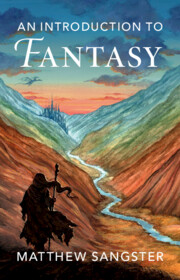Book contents
- An Introduction to Fantasy
- An Introduction to Fantasy
- Copyright page
- Contents
- Figures
- Introduction
- 1 Fantasy, Language and the Shaping of Culture
- 2 The Value of Iteration
- 3 Root Formations
- 4 Enlightenment and its Shadows
- 5 Fashioning Worlds
- 6 Fantastic Communities and Common Ground
- Envoi
- Acknowledgements
- Select Bibliography
- Index
1 - Fantasy, Language and the Shaping of Culture
Published online by Cambridge University Press: 07 October 2023
- An Introduction to Fantasy
- An Introduction to Fantasy
- Copyright page
- Contents
- Figures
- Introduction
- 1 Fantasy, Language and the Shaping of Culture
- 2 The Value of Iteration
- 3 Root Formations
- 4 Enlightenment and its Shadows
- 5 Fashioning Worlds
- 6 Fantastic Communities and Common Ground
- Envoi
- Acknowledgements
- Select Bibliography
- Index
Summary
This chapter considers how Fantasy is rooted in language’s ability to describe things that do not exist, arguing that this same ability is crucial for constructing the value systems that allow human cultures to operate. In intervening in conversations about meaningfulness and identity, Fantasy plays with heady stuff, but by explicitly parading its impossibility, it creates productive and revealing abstractions that can both playfully and critically interrogate received norms and languages of power. Fantasies ask whether the world we have made through language is the one we want, holding open imaginative spaces for alternatives that are by turns utopian, dystopian, revealingly similar and radically different. Key works discussed in this chapter include Terry Pratchett’s Hogfather, Plato’s Republic, Ursula K. Le Guin’s Earthsea Books, Ted Chiang’s ‘Story of Your Life’, Hayao Miyazaki’s Spirited Away, Steven Erikson’s Malazan Book of the Fallen, Jorge Luis Borges’s ‘Tlön, Uqbar, Orbis Tertius’, Hope Mirrlees’s Lud-in-the-Mist and Mikhail Bulgakov’s The Master and Margarita.
Keywords
- Type
- Chapter
- Information
- An Introduction to Fantasy , pp. 53 - 96Publisher: Cambridge University PressPrint publication year: 2023

